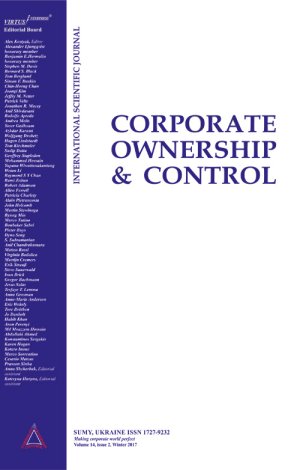
-
 Journal menu
Journal menu

- General information
- Editorial Board and External Reviewers
- Journal Policies
- Publication Ethics and Malpractice Statement
- Instructions for authors
- Paper reviewing
- Article processing charge
- Feedback from stakeholders
- Journal’s Open Access statement
- Order hard copies of the journal
- 50 most cited papers in the journal
CAPITAL STRUCTURE IN THE CONTEXT OF CEO’S RENT EXTRACTION
Download This ArticleAbstract
This paper investigates the impact of earnings management on market return (by the proxies of discretionary accruals and earnings response coefficient/CAR regarded as accounting and market based earnings quality, respectively) along with a number of moderating (both governance and financial) variables in an emerging market context. Indonesia. Building on extant literature and using panel data approach, it examines 52 manufacturing firms listed on the Indonesia stock exchange during 2007 to 2010 periods. Applying Modified Jones Model to measure earnings management, our regression analysis reveals that earnings management has significant negative influence of market return. Of the moderating variables, board size, leverage and firm size are showing significant effects on market return, but not the institutional ownership. Again, observing the use of moderator effects on earnings management, our findings confirm that board size has more predictive power than institutional ownership in deterring earnings management and weaken the association between earnings management and market return. Similarly, leverage has strengthened the relation between earnings management and market return showing more exposure to earnings management while firm size showing a tendency to weakening earnings management, on the contrary. These results have enormous implications for Indonesian corporate sector and policy makers in adopting appropriate governance measures to constrain earnings management and improve quality of earnings.
Keywords: Cost of Capital, Financial Leverage, CEO’s Power
How to cite this paper: Rashid, M., Drira, M., & Sharma, B. (2014). Capital structure in the context of CEO’s rent extraction. Corporate Ownership & Control, 11(2-2), 281-288. https://doi.org/10.22495/cocv11i2c2p5

















